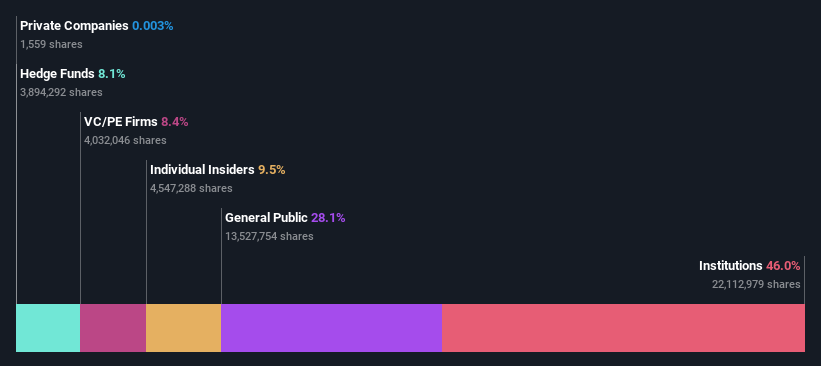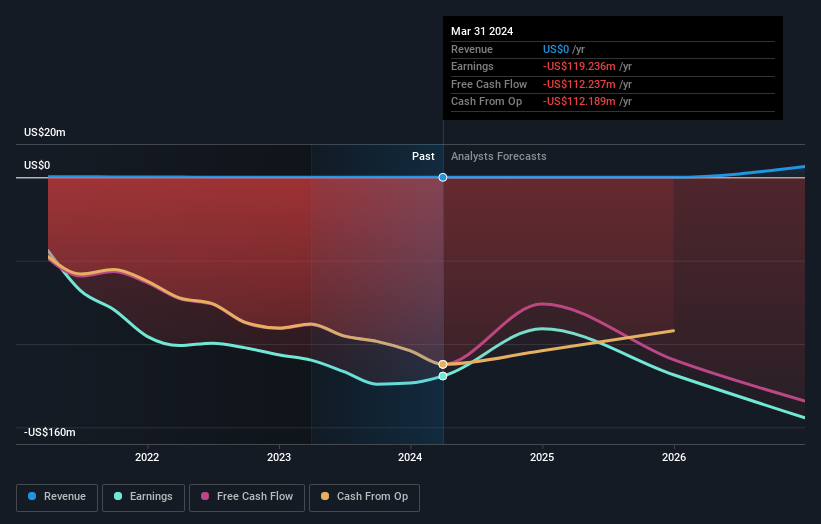Institutional owners may consider drastic measures as BioAtla, Inc.'s (NASDAQ:BCAB) recent US$35m drop adds to long-term losses
Key Insights
Significantly high institutional ownership implies BioAtla's stock price is sensitive to their trading actions
The top 12 shareholders own 50% of the company
Ownership research along with analyst forecasts data help provide a good understanding of opportunities in a stock
Every investor in BioAtla, Inc. (NASDAQ:BCAB) should be aware of the most powerful shareholder groups. We can see that institutions own the lion's share in the company with 46% ownership. In other words, the group stands to gain the most (or lose the most) from their investment into the company.
As a result, institutional investors endured the highest losses last week after market cap fell by US$35m. Needless to say, the recent loss which further adds to the one-year loss to shareholders of 29% might not go down well especially with this category of shareholders. Institutions or "liquidity providers" control large sums of money and therefore, these types of investors usually have a lot of influence over stock price movements. Hence, if weakness in BioAtla's share price continues, institutional investors may feel compelled to sell the stock, which might not be ideal for individual investors.
Let's delve deeper into each type of owner of BioAtla, beginning with the chart below.
Check out our latest analysis for BioAtla
What Does The Institutional Ownership Tell Us About BioAtla?
Institutional investors commonly compare their own returns to the returns of a commonly followed index. So they generally do consider buying larger companies that are included in the relevant benchmark index.
BioAtla already has institutions on the share registry. Indeed, they own a respectable stake in the company. This can indicate that the company has a certain degree of credibility in the investment community. However, it is best to be wary of relying on the supposed validation that comes with institutional investors. They too, get it wrong sometimes. If multiple institutions change their view on a stock at the same time, you could see the share price drop fast. It's therefore worth looking at BioAtla's earnings history below. Of course, the future is what really matters.
It looks like hedge funds own 8.1% of BioAtla shares. That catches my attention because hedge funds sometimes try to influence management, or bring about changes that will create near term value for shareholders. Acorn Bioventures is currently the company's largest shareholder with 8.4% of shares outstanding. In comparison, the second and third largest shareholders hold about 8.1% and 5.8% of the stock. In addition, we found that Jay Short, the CEO has 5.6% of the shares allocated to their name.
A closer look at our ownership figures suggests that the top 12 shareholders have a combined ownership of 50% implying that no single shareholder has a majority.
Researching institutional ownership is a good way to gauge and filter a stock's expected performance. The same can be achieved by studying analyst sentiments. There are a reasonable number of analysts covering the stock, so it might be useful to find out their aggregate view on the future.
Insider Ownership Of BioAtla
The definition of company insiders can be subjective and does vary between jurisdictions. Our data reflects individual insiders, capturing board members at the very least. The company management answer to the board and the latter should represent the interests of shareholders. Notably, sometimes top-level managers are on the board themselves.
Most consider insider ownership a positive because it can indicate the board is well aligned with other shareholders. However, on some occasions too much power is concentrated within this group.
We can report that insiders do own shares in BioAtla, Inc.. As individuals, the insiders collectively own US$11m worth of the US$112m company. It is good to see some investment by insiders, but we usually like to see higher insider holdings. It might be worth checking if those insiders have been buying.
General Public Ownership
The general public, who are usually individual investors, hold a 28% stake in BioAtla. While this size of ownership may not be enough to sway a policy decision in their favour, they can still make a collective impact on company policies.
Private Equity Ownership
Private equity firms hold a 8.4% stake in BioAtla. This suggests they can be influential in key policy decisions. Some might like this, because private equity are sometimes activists who hold management accountable. But other times, private equity is selling out, having taking the company public.
Next Steps:
I find it very interesting to look at who exactly owns a company. But to truly gain insight, we need to consider other information, too. Be aware that BioAtla is showing 4 warning signs in our investment analysis , and 2 of those are a bit unpleasant...
Ultimately the future is most important. You can access this free report on analyst forecasts for the company.
NB: Figures in this article are calculated using data from the last twelve months, which refer to the 12-month period ending on the last date of the month the financial statement is dated. This may not be consistent with full year annual report figures.
Have feedback on this article? Concerned about the content? Get in touch with us directly. Alternatively, email editorial-team (at) simplywallst.com.
This article by Simply Wall St is general in nature. We provide commentary based on historical data and analyst forecasts only using an unbiased methodology and our articles are not intended to be financial advice. It does not constitute a recommendation to buy or sell any stock, and does not take account of your objectives, or your financial situation. We aim to bring you long-term focused analysis driven by fundamental data. Note that our analysis may not factor in the latest price-sensitive company announcements or qualitative material. Simply Wall St has no position in any stocks mentioned.

 Yahoo Finance
Yahoo Finance 

